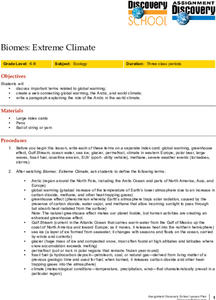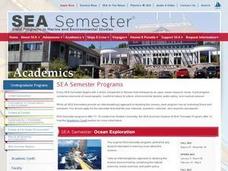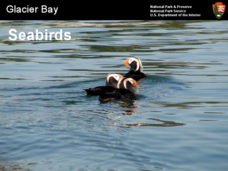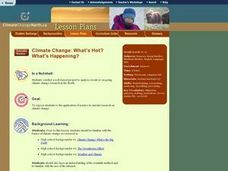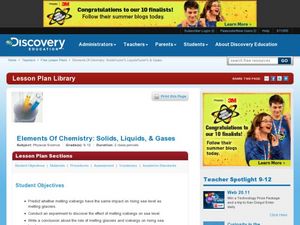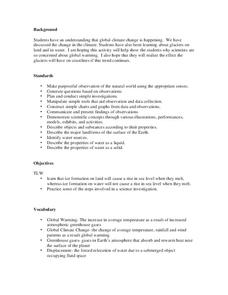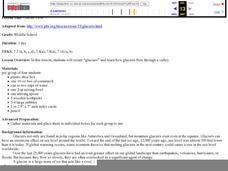Space Awareness
The Big Meltdown
Explore the world (our world) of melting ice caps. Why are these caps melting? What is the effect of melting ice caps? Dive into the ever-present issue of global warming with a resource that has learners looking at data and participating...
Curated OER
Where Have All the Glaciers Gone?
Young scholars examine how climate change is affecting sea ice, vegetation and glaciers in the Arctic region.
Curated OER
Thermal Expansion
Learners examine how thermal expansion of water can affect sea level. They conduct an experiment that demonstrates what happens to water levels when exposed to heat, record the results on a data sheet, and discuss the results.
Curated OER
Biomes: Extreme Climate
Students create a web connecting global warming, the Arctic, and wold climate. They write a paragraph explaining the role of the Arctic in world climate.
Curated OER
Waters of the Earth
Young scholars make a striking visual display showing the distribution of water on earth.
Curated OER
Mystery of the Megaflood
Young scholars will use everyday items and speeds to describe the dimensions of a massive flood that occurred in the Pacific Northwest near the end of the last ice age.
It's About Time
Paleoclimates
How do scientists know what the Earth was like in the past? This second installment of a six-part series focuses on paleoclimates and provides an overview of how geologists determine information about past climates using fossil...
Curated OER
Glacier Bay Seabirds
A gorgeous collection of photographs take viewers on a virtual tour or Glacier Bay National Park with a focus on the seabirds living in the area. Adaptations to the polar climate are highlighted, different species of birds are displayed,...
Curated OER
Glacial Climbing
Students plot the current distribution of glaciers around the Earth and see if there any major trends where glaciers appear to be either growing or shrinking at abnormally high rates.
Curated OER
Glacier Climbing
Students discover where glaciers exist and how they move. For this glacier lesson, students work in groups to create a glacier in a replica valley and observe its properties.
Curated OER
Climate Change: What's Hot? What's Happening?
Students conduct a web-based project to analyze recent or on-going climate change research in the North. They are exposed to the application of science in current research on climate change.
Curated OER
When Land Ice Melts
Students investigate what happens when land ice melts. They discuss how the melting of land ice is different than the melting of icebergs. Students observe what happens as the ice melts.
Curated OER
Elements of Chemistry: Solids, Liquids and Gases
Students predict if icebergs melting has an effect on the sea level rising. In this global warming lesson students complete an experiment to see the effects of melting icebergs and write a conclusion on their data collected.
Curated OER
Glacier Climbing
Middle schoolers discuss glaciers and the current distribution of glaciers around the Earth. They create simulated glaciers using cornstarch, shoeboxes, water, and pebbles.
Curated OER
Global Climate Change
Second graders investigate the effect of melting glaciers to sea level. In this earth science lesson, 2nd graders simulate the process in the lab by conducting an experiment using ice cubes and clay. They explain the consequences of...
Curated OER
Icebergs Ahead!
Students experiment with density of ice, and examine how density affects how icebergs float in water.
Curated OER
Glacier Flow
Middle schoolers investigate how glaciers flow through valleys. They answer discussion questions, and in small groups create a simulation of a glacier using a plastic shoe box, water, cornstarch, and pebbles, evaluating their results on...
Montana State University
Meet Mount Everest
Learning about one landform might seem boring to some, but using the resource provided practically guarantees scholar interest. The second in a sequential series of eight covering the topic of Mount Everest includes activities such as a...
Curated OER
Shifting Coastlines
Students study North Carolina's changing coastline during the Paleoindian and Archaic periods and determine the positions of the coastline at different times and decide what types of archaeological information has been lost due to rising...
Curated OER
Ocean World
In this online interactive science worksheet, students respond to 7 multiple choice questions regarding icebergs. Students may submit their answers to evaluated.
Curated OER
Elements In Chemistry: Solids, Liquids and Gases
Students investigate the kinetic-molecular theory. In this state of matter lesson, students consider the differences of melting glaciers, melting icebergs and investigate on what happens when submerged water melts.
Curated OER
Glacier Presentations
Young scholars research news articles relating to global climate change. In this earth science lesson, students create a news broadcast using the information they gathered. They present this in class and each student gives their peer...
Curated OER
Water Water Everywhere and Not a Drop to Drink!
Students describe limitations of fresh water resources on ships at sea. They realize the value of fresh water on the ocean and around the world. Students gain a knowledge of the process and economic cost of desalinization.
World Wildlife Fund
Land of the Midnight Sun
From days of 24 hour sunlight, to endless nights that last for days, the Arctic is a very unique place to live. Examine the seasonal changes that occur in the northern-most reaches of the globe and the impact they have on the plants and...





